

Project «Voices of Jewish settlements. Vitebsk region.»פיתוח קשרי התרבות בין העמים של ישראל ובלרוס
|
|---|
Website search |
|
MainNew publicationsContactsSite mapVitebsk regionMogilev regionMinsk regionArkady Shulman
|
ON THE SWINGS OF TIME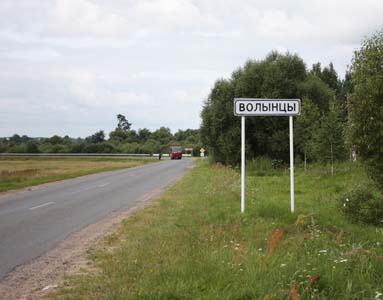 Volyntsy. Entrance to the village.Photo taken in 2009.
Volyntsy. Entrance to the village.Photo taken in 2009.
- I am probably the only native resident in Volyntsy, - Ada Philippovna Shaverduk began her story with these words. Some of the old residents are dead, while others are living with their children in other places. Therefore, Ada Philippovna was the only one in Volyntsy, who could share stories about the pre-war times (she was born in 1930) and the horrible war years. I, together with Nadezhda Ananievna Sosnovskaya, a fund curator at Ivan Chersky Museum, came to visit Ada Philippovna. Nadezhda Ananievna is not from Volyntsy. She used to live in Lithuania; then moved to the Far North with her husband. When the Soviet Union fell a, they decided to move to her husband’s place of birth – Volyntsy. She gave me a call and invited me to visit Volyntsy, adding that there would be a lot of interesting facts for our research. Ada Philippovna was waiting for us. We noticed several pre-war photographs on the table. In one of them I saw school children. 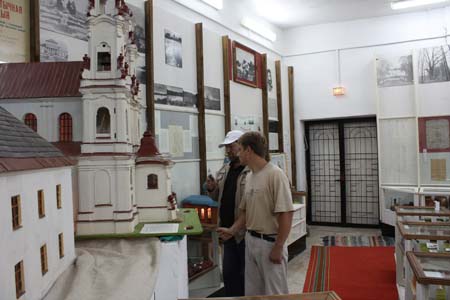 Chersky museum. Photo taken in 2009.
Chersky museum. Photo taken in 2009.
“If we talk about pre-war years, best of all I remember my school, friends and teachers. There were a lot of children here, so the primary school worked in two shifts. On the hill next to the Catholic church there was a secondary school (in the building of a former monastery). Later, in 1940, a new school was built. There was only one graduation before the war.” Before the mid 30s Volyntsy had its own Jewish school. Rosa Iosifovna Sverdlova remembers it very well. She is now living in Vitebsk but spent most of her life in Volyntsy. I met her before my trip to Verhnedvinsk region and she told me the story of her life. “I studied at the Jewish school until the 4th grade and then attended a Belarusian one. I finished the 10th grade in 1941. Right after the graduation party we found out about the war – on June 22nd.” Rosa Iosifovna told me about the local synagogue. Her memories are about the end of the 20s. “There was a synagogue in Volyntsy. At that time I was small and attended it with my mother. It was a two-storey wooden building. Women prayed on the balcony of the second floor. For some reason I remember them crying. Men prayed on the first floor, swaying from side to side. I remember them dancing. Most probably my memories are connected with holidays. Volyntsy had a rabbi, but I do not remember why and when he left his post. My father, Joseph Haimovich Sverdlov, was a religious person. He attended the synagogue daily.” When I listened to the stories about Voyntsy, I felt like I was swaying on the swings of time. 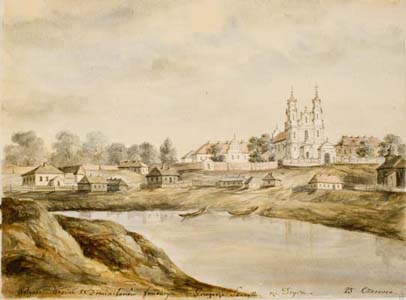 Volyntsy. Picture of Napoleon Orda.
Volyntsy. Picture of Napoleon Orda.
Volyntsy did not have a Jewish cemetery because the dead were taken to the cemetery in Drissa (now Verhnedvinsk), which was rather far off. Ada Philippovna Shaverduk recalls pre-war trade fairs and bazaars. “My mom and I usually attended them. The crowd was rather thick and sometimes we would lose each other. Then there was no point in looking for each other – we would meet at home. On the day of the trade fairs men would usually sit down to talk, and of course, drink. It was possible to buy wine by glasses, not bottles. At that time men used to drink much less alcohol than nowadays.” Ada Phillipovna’s father used to work in a shop together with a Jewish woman Bronia. Mother was working in an organization, which controlled the quality of alcoholic beverages in Volyntsy. Mother died when Ada Philippovna was only eight. Rosa Iosifovna Sverdlova was talking about the pre-war years and crying. For some people it’s history; for her – her youth, time of dreams and fantasies. 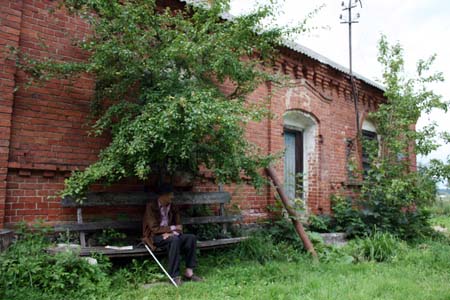 Volyntsy. An old pre-war house. Photo taken in 2009.
Volyntsy. An old pre-war house. Photo taken in 2009.
“My father could speak Hebrew and Russian. The language we used at home was, of course, Yiddish. In the postwar years everyone in the village – the Jews, the Belarusians and the Poles – could speak Yiddish fluently. At home we celebrated the Passover and Purim. Everything was done according to the tradition. On Yom Kippur the whole family fasted. Before the Passover several families got together and made matsot. This usually took place in the Yudins' house. I came there to help. A Russian woman, Valentina, would make the dough. Before the war it became problematic to make matsot due to strong anti-religious propaganda. At that time I was graduating from school. My brother, Mikhail, lived in Moscow and was a member of the Komsomol party. In order to avoid problems the parents decided to stop making matsot. My brother would bring them from Moscow before the Passover – that was the solution to the problem. Mother, Ida Rafailovna, whose maiden name was Tuvinskaya, was a housewife. Although she was not fully literate and did not attend any educational institution, she was a naturally wise person. There were 4 children in the family – my three brothers and I. Our grandmother lived with us (mother's mother). Our family was not rich. We lived in a small house but there was enough room for everyone. In addition, we had a small household: a garden, a cow and chickens.” The summer of 1941 was not quiet. Military men, who often came to Volyntsy, hinted to their friends that if turmoil started, it would be better to move eastwards. Polish refugees that arrived in 1939 talked a lot about the horrors of Nazi occupation. 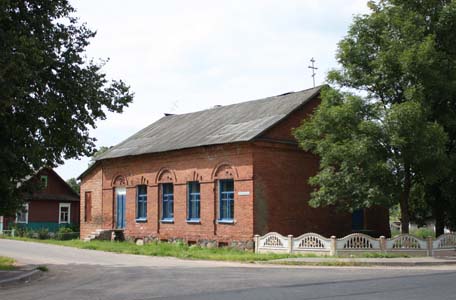 Volyntsy. Former Jewish school, now a church.
Volyntsy. Former Jewish school, now a church.Photo taken in 2009. Nevertheless, for most people the war began unexpectedly – they trusted the Soviet propaganda and were certain the Red Army would protect them. “There was no electricity in Volyntsy. Radio was only at the post office, - recalls Ada Philippovna. – Radio brought us the news about the war. Then, as far as I remember, the same day we saw German planes. They sky was black with them. They bombed us every day. Everyone was in panic. Father decided we would leave. We headed for the railway in hopes of getting on a train. When we approached the railroad, we saw German planes. They were flying very low and bombing a crowd of people, who were trying to escape. Many people were killed. There was panic. We lost my brother. Father said: “Let’s go back.” We returned to Volyntsy and saw our house was on fire. Some Jewish families left the town. Many decided to stay. I often don’t sleep at nights and think about that time. I try to remember how many Jewish houses there were in Volyntsy. I calculated 38 houses, a family living in each of them. Most of them had children…” 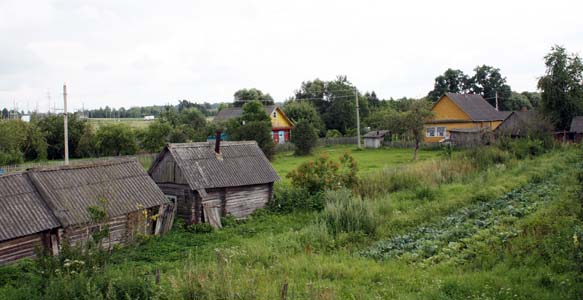 Volyntsy. In this part of the village there was a ghetto. Photo taken in 2009.
Volyntsy. In this part of the village there was a ghetto. Photo taken in 2009.
On July 12th 1941 Volyntsy was occupied by the German Army. The occupation lasted three full years. The town was liberated also on July 12th 1944. Ada Philippovna looked at an old pre-war photograph: “This is my friend Sonia Gurevich. Before the execution of the local Jews she decided to hid herself. However, then she ran out of the house to look for her child and check where her parents were. Policemen noticed her and took her to the commandant’s office. There were two Germans and a local policeman. Germans inquired: “Who is this?” The local policeman pretended he did not know. There was also a local woman in the room. She exclaimed: “Don’t you know? She is Jewish.” Sonia was taken to the ditch, where Jews had been shot, and stabbed with a knife.” In 1991 Maria Yegorovna Bulavskaya, a resident of Volyntsy, made a list of the Jews who were executed in Volyntsy in February, 1942. It contains about 40 names (all in all about 80 people were murdered by fascists there). There are no exact lists. Maybe there are people who can contact us and help restore the list of the fascist victims. 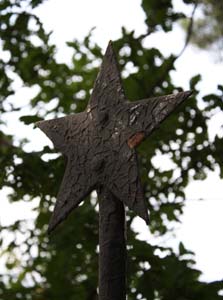 Voyntsy. Black star
Voyntsy. Black starat the location of the execution. Photo taken in 2009. Below is another extract from Rosa Sverdlova's article: «There is a mass grave in Volyntsy with a memorial, which has an inscription: «To the victims of fascism, murdered in February, 1942. Next to it there is a grave, where the Shenkmans were buried – my childhood friend Riva and her husband Mikhail, who participated in the Great Patriotic war. They had an incredible destiny. Riva Tzirkina came from a poor family. Our fathers were friends and her mother died at a young age, leaving five children... When fascists came, they immediately set up «the new authority», killing, hanging and shooting innocent people.» 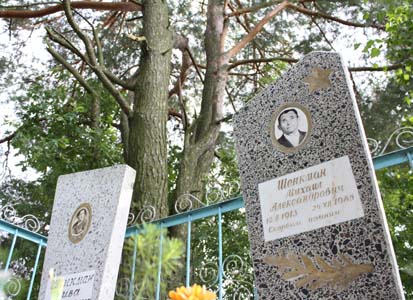 Tombstone on Mikhail and Riva Shenkman’s grave. Photo taken in 2009.
Tombstone on Mikhail and Riva Shenkman’s grave. Photo taken in 2009.
The ghetto residents realized that the worst was to happen any day. There were rumors that in neighboring villages the Germans were killing Jews. No doubts were left when a bug ditch was dug out in the pine forest. In addition, the Nazi policemen constantly mentioned that Jews would be exterminated. «Late at night, following her father's advice, Riva Tsirkina and her brother Lionia decided to escape. She was 16 and her brother – 12. The father stayed with the smaller children. ...They did not know where to go and were walking around the village until they met an acquaintance, who offered to shelter them, even though it put his life at risk. Later he took them to another village, where they stayed with his friend Petrovsky.» The Petrovskys sheltered Riva and Lionia for several months. They treated the children as if they were their own. Later, when someone in the village found out about the Jewish children, the Petrovskys were threatened they would be reported on. So they had to hide the children on the village outskirts. Soon policemen broke into the Petrovskys' house and cruelly beat up Arkady, the head of the family, trying to find out where the children had been hidden. Arkady said nothing. After that incident they decided the children would be better off in Rossony region, which was controlled by partisans, so they sent the brother and sister there.» Some time later the children joined the Soviet army, where Riva worked as a nurse. In 1998 Arkady Petrovsky, his wife Maria and daughters Alexandra and Zinaida were announced «The Righteous among the Nations». The parents were awarded the title posthumously, while the daughters often met Riva and helped each other. «The war was over and Riva's brother was demobilized. Their house in Volyntsy was not destroyed and they settled down there. Soon Riva married Mikhail Shenkman, a former partisan, whose family (wife and two children) had been shot by the Nazis. Riva gave birth to three sons. Later they moved to Polotsk. Riva and Mikhail wished to be buried next to the burial site of the ghetto Jews from Volyntsy.” Arkady ShulmanVolyntsy, August 2009. |
|||
|
|
Jewish settlements in Vitebsk regionVitebsk • Albrehtovo • Babinovichi • Baran • Bayevo • Begoml • Beshenkovichi • Bocheikovo • Bogushevsk • Borkovichi • Braslav • Bychiha • Chashniki • Disna • Dobromysli • Dokshitsy • Druya • Dubrovno • Glubokoye • Gorodok • Kamen • Kohanovo • Kolyshki • Kopys • Krasnopolie • Kublichi • Lepel • Liady • Liozno • Lukoml • Luzhki • Lyntupy • Miory • Obol • Oboltsy • Orsha • Osintorf • Ostrovno • Parafianovo • Plissa • Polotsk • Prozorki • Senno • Sharkovshina • Shumilino • Sirotino • Slaveni• Smolyany • Surazh • Tolochin • Ulla • Verhnedvinsk • Vidzy • Volyntsy • Yanovichi • Yezerishe • Zhary • Ziabki • |
Main |
New publications |
Contacts |
Site map |
Vitebsk region |
Mogilev region |
Minsk region |